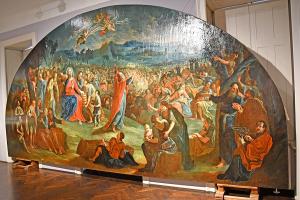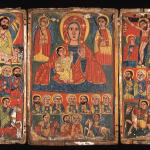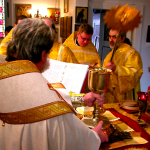
While we tend to think of the early Christian community as being utopian, peaceful and without strife, it wasn’t. It was every bit as divisive as it is now; to be sure, there were far fewer Christians, so the raw number of extreme egos and conflicts which arose was less than what we see today, but they were there. Paul, who understood Christianity was meant to bring people together, tried, as much as he could, to break through those conflicts and remind Christians of the unity should have:
I appeal to you, brethren, by the name of our Lord Jesus Christ, that all of you agree and that there be no dissensions among you, but that you be united in the same mind and the same judgment (1 Cor. 1:10 RSV).
Paul discovered there were some who were using him as a figurehead, using what he said and did as a way to justify their fights against other Christians. He wanted none of it: “Is Christ divided? Was Paul crucified for you? Or were you baptized in the name of Paul?” (1 Cor. 10:13 RSV). Christians are baptized into Christ; they become a part of Christ’s body. Christians should understand any infighting is as bad as bad as if someone had a body part fighting against a different part, such as if a right hand attacked the left for being on a different arm. Paul understood, accepted, and pointed out there will distinctions within the body of Christ, within the church, as everyone is different, but he wanted us to know that there should be a unity behind those differences. We need each other just as the various parts of the body need the rest of the body to thrive. Differences should not be used to create and foster division, but rather, they should serve as a way to recognize the value of everyone else, of what makes everyone unique and valuable, indeed, why every member of the body of Christ needs every other member. Then, Christians will be able to work together, to love each other, and will seek to make sure all rivalries and dissensions are overcome.
Indeed, Christians are meant to work for the common good. They are to work for the benefit of the Christian community, but also to society at large. They are to see the dignity of the human person, to see how it is affirmed and reinforced as they become a part of the body of Christ, but also how it can be seen in those who are outside the church. Those who have joined themselves to Christ are to follow Christ’s love for the world, promoting the common good of humanity, taking care of those in need, just as Christ did:
When it was evening, the disciples came to him and said, “This is a lonely place, and the day is now over; send the crowds away to go into the villages and buy food for themselves.” Jesus said, “They need not go away; you give them something to eat.” They said to him, “We have only five loaves here and two fish.” And he said, “Bring them here to me.” Then he ordered the crowds to sit down on the grass; and taking the five loaves and the two fish he looked up to heaven, and blessed, and broke and gave the loaves to the disciples, and the disciples gave them to the crowds. And they all ate and were satisfied. And they took up twelve baskets full of the broken pieces left over. And those who ate were about five thousand men, besides women and children (Matt. 14:15-21 RSV).
Christ fed the people spiritually and physically, and in neither instance, did he charge them anything. Those who had something to contribute, could and would do so, which is why his disciples were willing to share their food with everyone else. Jesus took and used what was offered and multiplied it with grace so that everyone would have enough food to eat when they came to listen to him. While the miracle is important, it is vital that we see it represents the way grace perfects nature. His disciples were concerned about the needs of the people, and shared what they had with others. Christ did not need to tell them to be concerned, but rather, they did it naturally. Christ took it and accepted it and with grace, made it sufficient for the crowd. Christians should be like the disciples here. They should not need to be told what others need; they should not need constant reminders that they are to take care of their neighbor. They certainly should not need to be reminded of the dignity of their neighbor, that their neighbor should not be mistreated or abused because they possesses the image and likeness of God in them. Christians should look to those who are hungry and not only be concerned about them, but do what they can to get them help. If they can give them food, they should do so, but if they can do more, if they can work to change the situation, to deal with the structures in society which hindered the hungry and the poor from thriving, they should do so as well. Too many Christians, when confronted with this, give all kinds of excuses; many talk about how foolish it is to help those who will not help themselves. When they do so, they show they have not listened to Christ. Paul’s answer to the division within the Christian community also works here; what appears foolish, is not, because behind it is the power of God: “For the word of the cross is folly to those who are perishing, but to us who are being saved it is the power of God” (1 Cor. 1:18 RSV).
Christians, therefore, should seek to be united with each other. They should realize their unity in Christ is actually the unity contained in the human condition when sin is overcome. It is a unity which is not meant to be for only Christians, but for everyone. God became human, took on human nature, and calls everyone to be one. When Christians allow themselves to be divided, they follow after the divisions of the world, allowing various sinful structures of the world gain control of them. This is what happens when Christians embrace nationalism: they look after and value their nation over and above the unity they are to have with the rest of humanity in Christ. Such Christian nationalism allows Christians support all kinds of grave injustices to be done to those who are not of the preferred nation, whether or not they are a Christian. Such Christians will say they look after our their own, but when they say that, they confirm their own is not their fellow Christian, not their fellow human, but some form of conventional, secular grouping. Woe to those Christians who do this, because they have fallen far from the faith while thinking they can and do preserve it because they believe a few doctrines they have been told. They ignore Christ and Christ’s ways at their peril.
Stay in touch! Like A Little Bit of Nothing on Facebook.
If you liked what you read, please consider sharing it with your friends and family!
N.B.: While I read comments to moderate them, I rarely respond to them. If I don’t respond to your comment directly, don’t assume I am unthankful for it. I appreciate it. But I want readers to feel free to ask questions, and hopefully, dialogue with each other. I have shared what I wanted to say, though some responses will get a brief reply by me, or, if I find it interesting and something I can engage fully, as the foundation for another post. I have had many posts inspired or improved upon thanks to my readers.










